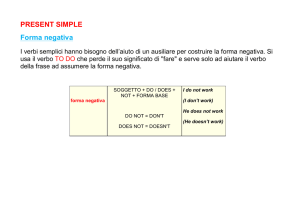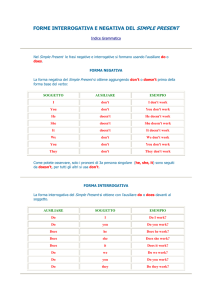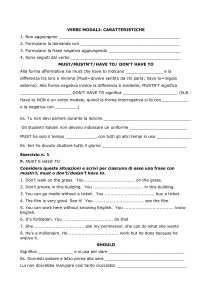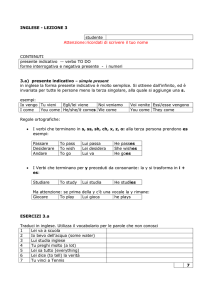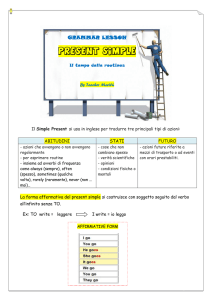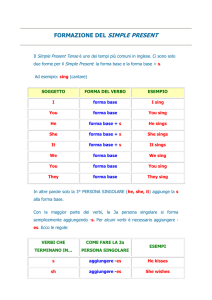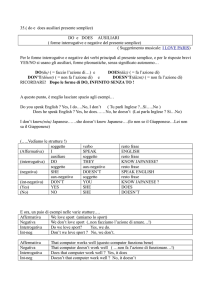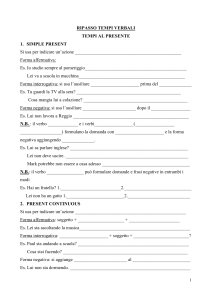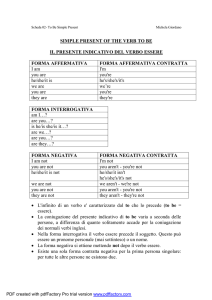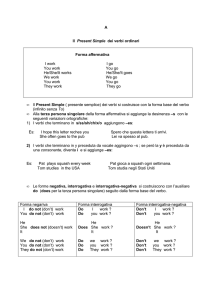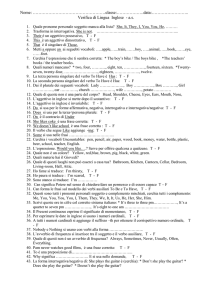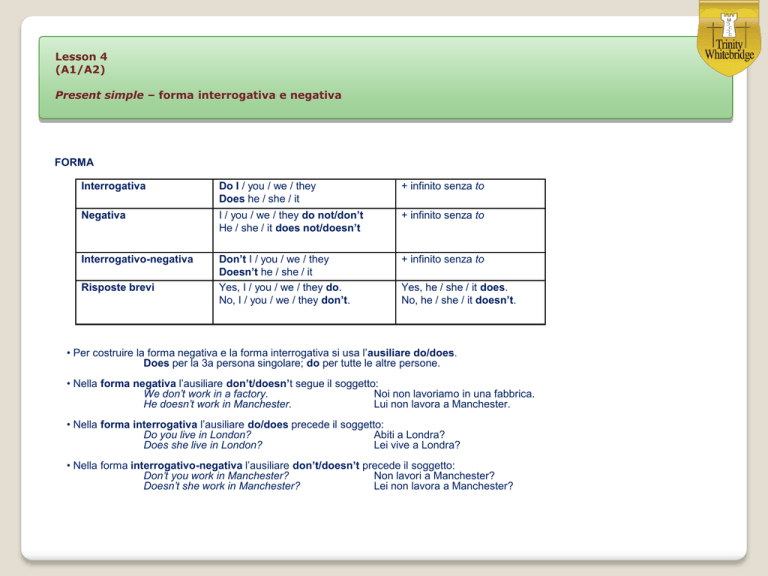
Lesson 4
(A1/A2)
Present simple – forma interrogativa e negativa
FORMA
Interrogativa
Do I / you / we / they
Does he / she / it
+ infinito senza to
Negativa
I / you / we / they do not/don’t
He / she / it does not/doesn’t
+ infinito senza to
Interrogativo-negativa
Don’t I / you / we / they
Doesn’t he / she / it
Yes, I / you / we / they do.
No, I / you / we / they don’t.
+ infinito senza to
Risposte brevi
Yes, he / she / it does.
No, he / she / it doesn’t.
• Per costruire la forma negativa e la forma interrogativa si usa l’ausiliare do/does.
Does per la 3a persona singolare; do per tutte le altre persone.
• Nella forma negativa l’ausiliare don’t/doesn’t segue il soggetto:
We don’t work in a factory.
Noi non lavoriamo in una fabbrica.
He doesn’t work in Manchester.
Lui non lavora a Manchester.
• Nella forma interrogativa l’ausiliare do/does precede il soggetto:
Do you live in London?
Abiti a Londra?
Does she live in London?
Lei vive a Londra?
• Nella forma interrogativo-negativa l’ausiliare don’t/doesn’t precede il soggetto:
Don’t you work in Manchester?
Non lavori a Manchester?
Doesn’t she work in Manchester?
Lei non lavora a Manchester?
Lesson 4
(A1/A2)
Present simple – forma interrogativa e negativa
Attenzione!
He doesn’t live…
Does she live…?
e non: He doesn’t lives …
e non: Does she lives…?
• Nelle risposte brevi si ripete do / does / don’t / doesn’t.
Does she come from France? - Yes, she does. / No, she doesn’t.
Do they start school at 9.00 a.m.? - Yes, they do. / No, they don’t.
Posizione degli avverbi di frequenza nelle frasi negative e interrogative
Frase negativa
dopo l’ausiliare
I don’t always get up early.
Non sempre mi alzo presto.
Frase interrogativa
tra soggetto e verbo principale
Do they often go to the cinema?
Vanno spesso al cinema?
Lesson 4
(A1/A2)
Question tags con il present simple
Le question tags (vero / non è vero?) che seguono frasi al present simple dei verbi ordinari si costruiscono come segue:
Frase
Question tag
Affermativa
interrogativo-negativa (con don’t / doesn’t)
You like coffee,
don’t you?
Ti piace il caffè,
vero?
Negativa
interrogativa (con do / does)
You don’t like coffee,
do you?
Non ti piace il caffè,
vero?
Confronta gli esempi:
• con verbi ordinari:
• con to be:
• con to have - possesso:
He lives in Madrid, doesn’t he? He doesn’t live in Madrid, does he?
She is beautiful, isn’t she?
She isn’t beautiful, is she?
He’s got a tablet, hasn’t he? He hasn’t got a tablet, has he?
Attenzione!
Le question tags con il verbo to have al presente richiedono:
• l’ausiliare have/has quando il verbo to have indica possesso o relazione
You’ve got a computer, haven’t you?
Hai un computer, vero?
You haven’t got a brother, have you?
Non hai un fratello, vero?
• l’ausiliare do/does quando il verbo to have ha funzione di verbo d’azione nelle frasi idiomatiche
You don’t have a big breakfast, do you?
Tu non fai una grande colazione, vero?
You have a break at 12.30, don’t you?
Fai una pausa alle 12.30, vero?
EXERCISE 1
Trasformiamo queste frasi in forma interrogativa, negativa e interrogativo-negativa.
1.
She works at a hospital.
……………………………………….……………….
……………………………………….……………….
……………………………………….……………….
2.
They like playing golf.
……………………………………….……………….
……………………………………….……………….
……………………………………….……………….
3.
You like playing cards.
……………………………………….……………….
……………………………………….……………….
……………………………………….……………….
EXERCISE 2
Completiamo questi dialoghi adeguatamente.
1.
A: (she / like) …………………….………. going to the cinema?
B: Yes, ……………. .
2.
A: (he / work) …………………….……… at the local school?
B: No, …………… .
3.
A: (they / like) …………………..….…….. jazz music?
B: No, …………… .
4.
A: (you / like) ………………………….... playing computer games?
B: Yes, I …………….… .
5.
A: (we / not / spend) ……………………………… too much money on technology?
B: Yes, ………………… .
EXERCISE 3
Immaginiamo questa situazione.
I genitori di Colin sono disperati. Che cosa dicono del loro figlio?
Completiamo le seguenti frasi con la forma negativa del present simple.
1.
Colin (not / study) .......................................... .
2.
He (not / do ) .......................................... his homework.
3.
His teachers say that he (not / pay) ...................................... attention in class.
4.
He (not / help) .......................................... in the house.
5.
He (not / listen) .......................................... to us!
6.
We (not / like) .......................................... his friends.
7.
They (not / study) .......................................... and just hang around all day.
8.
We (not / know) .......................................... what to do with our son.
EXERCISE 4
Trasciniamo in coda a ciascuna frase la question tag corretta.
Non tutte le question tags fornite debbono essere usate.
doesn’t she?
does she?
1.
They don’t often go to the theatre, ...................
2.
She doesn’t watch TV very often, ...................
3.
Pumas live in America, ...................
do you?
don’t you?
do they?
don’t you?
hasn’t she?
4.
What a lot of books! You like reading, ...................
5.
Well, I notice everything, ...................
6.
It often rains in England, ...................
aren’t you?
don’t I ?
does it?
7.
You usually have a party on your birthday, ...................
don’t they?
do I ?
does she?
8.
Jane doesn’t have lunch at home, ...................
does he?
doesn’t it?
EXERCISE 5
Riordiniamo le parole per formare frasi di senso compiuto.
Prima di tutto osserviamo per ciascuna frase se si tratta di frase affermativa, interrogativa o negativa.
È presente una question word (where, what, …)? Dove va collocata? Qual è il soggetto della frase? Dove va collocato? È presente un
avverbio o un’espressione di frequenza? Dove va collocato?
1.
stadium / don’t / we / go / to / often / the
....................................................................................
2.
to / early / always / he / go / does / bed / ?
....................................................................................
3.
they / do / chess / every day / play / ?
....................................................................................
4.
New York / Tom / from / phone / you / ever / does / ?
....................................................................................
5.
summer holidays / spend / you / do / where / usually / your / ?
....................................................................................

